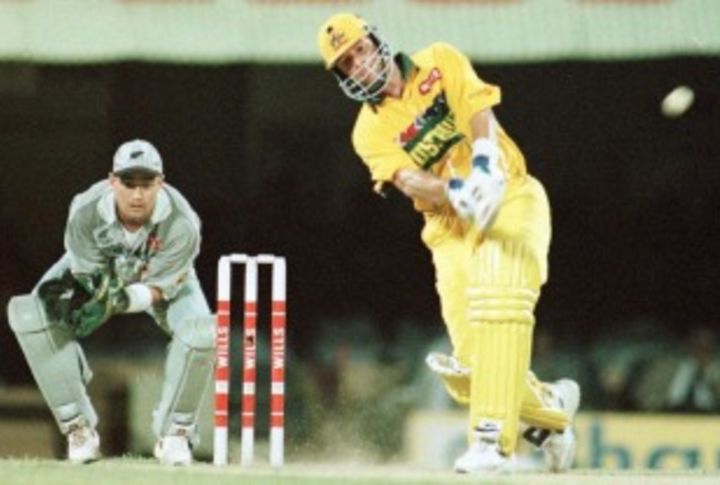De Silva's masterclass
The silkiness of Waugh, the flashing blade of Lara, and above all the domination of Aravinda

Aravinda de Silva, 3 for 42 and 107 not out v Australia, final, Lahore
Few cricketers have had an all-round influence on a match as significant as Aravinda de Silva did in the 1996 final. He took two catches, three wickets and scored a century against Australia to help Sri Lanka become the only host nation to win the World Cup.
Australia, after the loss of Mark Waugh, progressed to 137 for 1 with Mark Taylor and Ricky Ponting batting fluently. The first of de Silva's several contributions was the dismissal of Taylor, who was caught sweeping for 74. Four overs later Ponting failed to cut an offbreak and was bowled for 45. In a five-over spell de Silva had dismissed both set batsmen, leaving Australia vulnerable at 152 for 3. He played a part in two other wickets, catching Steve Waugh and Stuart Law before returning to scalp Ian Healy to finish with 3 for 42 in nine overs. Australia had been limited to 241 for 7, but no team had ever chased and won a World Cup.
By the sixth over of the chase Sri Lanka had lost their explosive openers for 23 runs. De Silva, who had fought a similar fire in the semi-final, forged a 125-run stand with Asanka Gurusinha that put the chase back on track. De Silva could not be dislodged and he scored steadily, not allowing the asking rate to climb. He struck 13 boundaries in his century and was unbeaten on 107 off 124 balls when the World Cup was won in the 47th over.
Mark Waugh, 110 v New Zealand, Chennai
Mark Waugh's third hundred of the tournament was his finest. Australia needed to make the second-highest total to win a World Cup match, under below-par lights and on a slow outfield, and Waugh whisked them past New Zealand's imposing 286.
Waugh scored 110 off 112 balls to follow hundreds in the group games against Kenya and India. It was a cool, breezy innings, and one of the best centuries in a chase. His batting was unfussy and easy on the eye, and the clinical manner in which he collected runs and set up the finish for the lower order underlined the professionalism of the Australian side.
Waugh's accumulation was so smooth that many spectators didn't realise he had reached 50 until the electronic scoreboard flashed it. In two-and-a-half hours of nimble-footed driving and flicking, mixed with two big sixes, Waugh ensured New Zealand barely had a chance of defending their score. His 86-run partnership with his twin, Steve, (59 not out) was enough to seal a six-wicket win with 13 balls to spare. You had to sympathise with New Zealand allrounder Chris Harris, whose career-best 130 was a champion effort in a losing cause.
Brian Lara, 111 v West Indies, Karachi
West Indies were in freefall. One year previously, they had been deposed on home soil by Australia, and with Richie Richardson fading as a leader, they were beset by internecine warfare in the team. Eleven days earlier in Pune, they had lost to the amateur Kenyans; now they faced the form team of the tournament, South Africa, in a quarter-final.
Beware, however, the flashing blade of Brian Lara. It was a warning South Africa failed to heed, and on a cracked Karachi pitch they made their biggest mistake of the tournament - omitting spearhead Allan Donald for an extra spinner, Paul Adams.
It was a decision Lara greeted with glee. The fixture was already loaded with baggage after Lara's controversial remarks following the Kenya game, when he allegedly claimed he was happier to have lost to a black team than to a white one. And given an opportunity to atone for his irresponsible dismissal in that defeat, Lara needed no second bidding. He was cagey at first, playing and missing against the seamers, but milked Adams and Pat Symcox, who he also hit for five fours in an over, to glorious effect. South Africa's ground fielding went to pieces under pressure and Lara finished with 111 from 94 balls, before West Indies' spinners sealed a 19-run win.
Aravinda de Silva, 66 v India, semi-final, Calcutta
It was a bit of a myth that Sri Lanka were propelled to the semis by explosive starts from Sanath Jayasuriya and Romesh Kaluwitharana. Their legend was built on an assault against India in the league match in New Delhi. Chasing 272, they had blasted 53 in the first five overs. It was against the backdrop of this massacre that India met Sri Lanka in the semi-final at Eden Gardens.
The match had a dramatic start. Both of India's tormentors were gone in the first four balls. But what happened in the next hour was breathtaking. De Silva batted as if he was in a trance, untouched by the gravity of his team's situation, and immune to the roars of a 100,000-strong partisan crowd. His 50 came off 32 balls and contained 11 fours. Yet there was no trace of violence. Instead he played the purest of cricket strokes, hitting cleanly between cover and extra cover with such precision that fielders were rendered redundant.
Such was de Silva's command that while Sri Lanka galloped at nearly seven an over, Asanka Gurusinha scored only a run in 16 balls and de Silva barely noticed when his partner went. He hit three more sublime fours and was gone on the stroke of the 15th over. It left Sri Lanka at 85 for 4, but India had been stunned and Sri Lanka reached 251, a total that would prove beyond India on a fast-deteriorating pitch.
Read in App
Elevate your reading experience on ESPNcricinfo App.